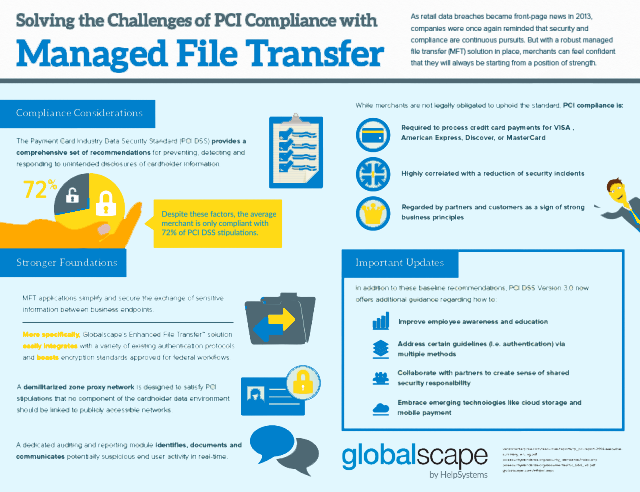With PCI DSS version 3 in full effect in 2014, organizations accepting credit cards must abide by new standards. Our infographic details the changes to PCI DSS and how managed file transfer solutions can help.
The Payment Card Industry Data Security Standard (PCI DSS) creates a framework through which companies can approach information security, especially with regard to sensitive electronic transaction data. The stipulations offer guidance organizations can use to prevent, detect, and respond to unintended disclosure of this information, and the four largest credit card companies require businesses to comply.
Version 3 of the PCI DSS, which came into effect in January 2014, offers additional recommendations to improve employee education, address guidelines via multiple methods, work with partners to share security responsibility, and incorporate emerging technologies such as cloud computing and mobile payment.
However, the challenge of achieving and maintaining compliance is not a small one. The average merchant upholds only about 72 percent of PCI DSS controls. That’s where the tools included in a managed file transfer solution can serve as true assets to help organizations guard against data breaches and implement a compliant system.
MFT simplifies and secures information exchanges. Globalscape’s Enhanced File TransferTM solution integrates with existing authentication protocols and utilizes encryption standards that are used by the federal government to protect sensitive information. With a demilitarized zone proxy network and dedicated auditing and reporting modules, EFT makes it easier for companies to establish networks to meet PCI stipulations and identify potentially suspicious activity before it becomes a serious issue.
Although merchants are not bound by law to uphold PCI DSS requirements, there are a number of advantages to doing so. Compliance has been highly correlated with a reduction in security incidents, which can have devastating consequences for organizations and customers. Partners and patrons are also likely to regard compliant businesses as more responsible and trustworthy, especially since the PCI DSS is well regarded as the industry standard for data protection.
